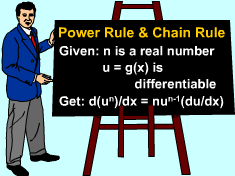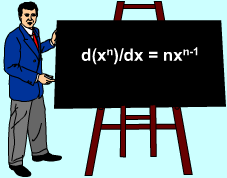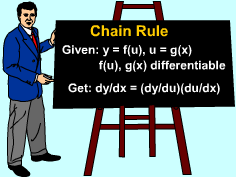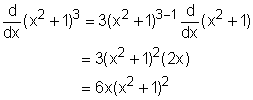| Ch 2. Derivatives I | Multimedia Engineering Math | ||||||
|
Derivative Formulas |
Trigonometric Functions |
Differentiability |
Chain Rule |
Implicit Differentiation |
|||
| Chain Rule | Case Intro | Theory | Case Solution |
| Chapter |
| 1. Limits |
| 2. Derivatives I |
| 3. Derivatives II |
| 4. Mean Value |
| 5. Curve Sketching |
| 6. Integrals |
| 7. Inverse Functions |
| 8. Integration Tech. |
| 9. Integrate App. |
| 10. Parametric Eqs. |
| 11. Polar Coord. |
| 12. Series |
| Appendix |
| Basic Math |
| Units |
| eBooks |
| Dynamics |
| Fluids |
| Math |
| Mechanics |
| Statics |
| Thermodynamics |
| ©Kurt Gramoll |
| |
||
|
|
In previous sections, various formulas have been introduced to calculate derivatives. However, it is not possible to have a formula for every possible situation. Thus, basic formulas like d(xn)/dx = nxn-1 need to be generalized so they can be used in a variety of cases. Suppose y = (x2 + 1)3, how can dy/dx be calculated using derivative formula? Let f(u) = u3, where u = g(x) = x2 + 1. Then The derivative of f and g can be calculated according to derivative
formula. A rule is needed to calculate the derivative of F which is a
composite function. This rule is named as Chain Rule. |
|
| Chain Rule |
||
|
|
The Chain Rule states: If the derivatives of g(x) and f(g(x)) exist, and F = f g is the composite function defined by F(x) = f(g(x)), then the derivative of F(x) exists and is given by F'(x) = f '(g(x))g'(x) In other words, If both y = f(u) and u = g(x) are differentiable functions, then |
|
|
||
| The Power Rule and the Chain
Rule |
||
 The Power Rule and the Chain Rule |
When y = (x2 + 1)3, y relates to the power function of x2 + 1, this is a special case of chain rule. If n is any real number and u = g(x) is differentiable, then |
|
| Returning to the example y = (x2 + 1)3, dy/dx can be easily be determined. Let y = f(u) = u3 and u = g(x) = x2 + 1, then so |
||
|
|
||


